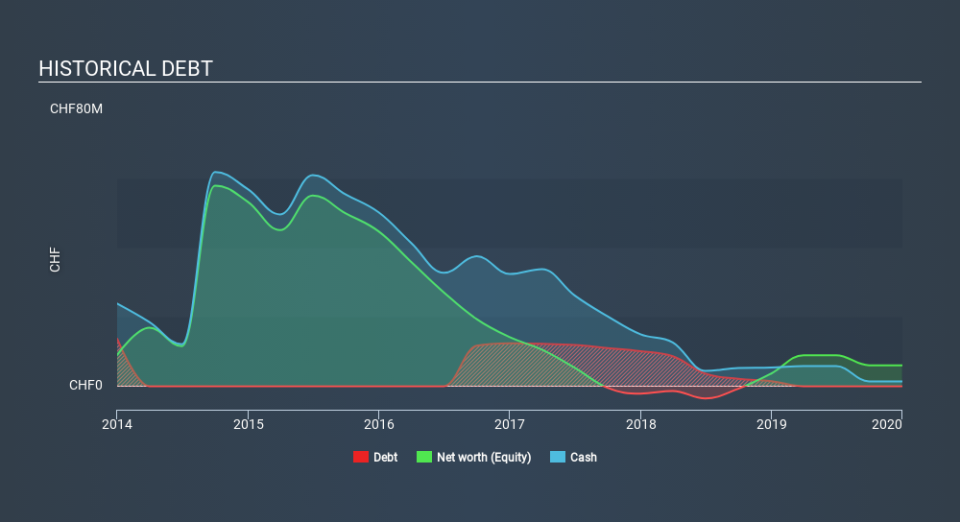Here's Why We Worry About Auris Medical Holding's (NASDAQ:EARS) Cash Burn Situation

Just because a business does not make any money, does not mean that the stock will go down. For example, although Amazon.com made losses for many years after listing, if you had bought and held the shares since 1999, you would have made a fortune. But while the successes are well known, investors should not ignore the very many unprofitable companies that simply burn through all their cash and collapse.
So should Auris Medical Holding (NASDAQ:EARS) shareholders be worried about its cash burn? For the purpose of this article, we'll define cash burn as the amount of cash the company is spending each year to fund its growth (also called its negative free cash flow). First, we'll determine its cash runway by comparing its cash burn with its cash reserves.
View our latest analysis for Auris Medical Holding
How Long Is Auris Medical Holding's Cash Runway?
A cash runway is defined as the length of time it would take a company to run out of money if it kept spending at its current rate of cash burn. As at December 2019, Auris Medical Holding had cash of CHF1.4m and no debt. Looking at the last year, the company burnt through CHF11m. That means it had a cash runway of around 1 months as of December 2019. It's extremely surprising to us that the company has allowed its cash runway to get that short! The image below shows how its cash balance has been changing over the last few years.
How Is Auris Medical Holding's Cash Burn Changing Over Time?
Auris Medical Holding didn't record any revenue over the last year, indicating that it's an early stage company still developing its business. So while we can't look to sales to understand growth, we can look at how the cash burn is changing to understand how expenditure is trending over time. Given the length of the cash runway, we'd interpret the 25% reduction in cash burn, in twelve months, as prudent if not necessary for capital preservation. While the past is always worth studying, it is the future that matters most of all. So you might want to take a peek at how much the company is expected to grow in the next few years.
How Hard Would It Be For Auris Medical Holding To Raise More Cash For Growth?
While Auris Medical Holding is showing a solid reduction in its cash burn, it's still worth considering how easily it could raise more cash, even just to fuel faster growth. Generally speaking, a listed business can raise new cash through issuing shares or taking on debt. Many companies end up issuing new shares to fund future growth. By looking at a company's cash burn relative to its market capitalisation, we gain insight on how much shareholders would be diluted if the company needed to raise enough cash to cover another year's cash burn.
Auris Medical Holding has a market capitalisation of CHF4.6m and burnt through CHF11m last year, which is 250% of the company's market value. That suggests the company may have some funding difficulties, and we'd be very wary of the stock.
Is Auris Medical Holding's Cash Burn A Worry?
As you can probably tell by now, we're rather concerned about Auris Medical Holding's cash burn. In particular, we think its cash runway suggests it isn't in a good position to keep funding growth. And although we accept its cash burn reduction wasn't as worrying as its cash runway, it was still a real negative; as indeed were all the factors we considered in this article. Looking at the metrics in this article all together, we consider its cash burn situation to be rather dangerous, and likely to cost shareholders one way or the other. Separately, we looked at different risks affecting the company and spotted 6 warning signs for Auris Medical Holding (of which 4 shouldn't be ignored!) you should know about.
Of course Auris Medical Holding may not be the best stock to buy. So you may wish to see this free collection of companies boasting high return on equity, or this list of stocks that insiders are buying.
If you spot an error that warrants correction, please contact the editor at editorial-team@simplywallst.com. This article by Simply Wall St is general in nature. It does not constitute a recommendation to buy or sell any stock, and does not take account of your objectives, or your financial situation. Simply Wall St has no position in the stocks mentioned.
We aim to bring you long-term focused research analysis driven by fundamental data. Note that our analysis may not factor in the latest price-sensitive company announcements or qualitative material. Thank you for reading.

